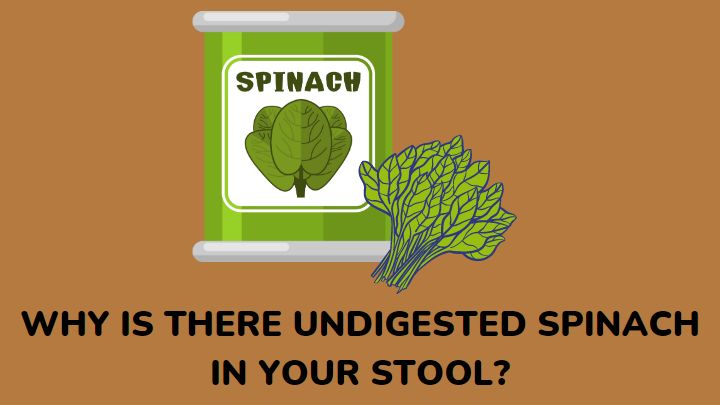The appearance of your stool is a reflection of your diet. If you eat a lot of green vegetables like spinach, be prepared to see some undigested leaves in your stool.
Spinach is a leafy green vegetable that hails from Persia. It has an impressive nutrient profile and can be consumed raw. However, sometimes it can cause undigested matter to appear in the stool.
This is usually not a cause for concern and will pass without treatment. However, if it occurs too frequently and is accompanied by other symptoms, it may indicate a more serious problem, and medical advice should be sought.
This guide is for you if you’re concerned about undigested spinach in the stool.
Is spinach hard to digest?
Spinach is not particularly hard to digest, but there are a few things to keep in mind. Spinach is high in fiber, so if you don’t regularly consume a lot of fiber, it could cause digestive discomfort.
Also, spinach is also high in oxalates, which can bind to calcium and other minerals and make them less absorbable.
You might want to avoid spinach or eat it in moderation if you’re on a low-calcium diet or have kidney problems.
Additionally, some people find it hard to digest raw spinach because of its tough texture. If this is a problem for you, try cooking the spinach before eating it.
What are the signs of undigested spinach in stool?
Undigested spinach in your stool may be green or dark green. You may also notice that your stool is softer than usual.
These symptoms are usually not a cause for concern and will go away. However, you should see a doctor if you experience severe abdominal pain, bloody stools, or diarrhea.
Causes of undigested spinach in stool
Undigested spinach can result from poor chewing or speedy food consumption. When next you eat spinach, chew properly to ensure the food is broken down and can pass through your digestive tract with ease.
Other causes include:
- Poor digestion: If your digestive system is not functioning properly, it may not be able to break down the nutrients in spinach. This can lead to undigested spinach in your stool.
- Poor absorption: Certain medical conditions, such as celiac disease or inflammatory bowel disease, can cause poor absorption of nutrients from food.
- Medications: Some medications, such as antacids or antibiotics, can interfere with digestion and lead to undigested food in the stool.
- Eating too much spinach: If you eat a large amount of spinach at one time, your body may not be able to digest it all.
- Allergies or sensitivities: allergies or sensitivity to spinach enzymes can lead to undigested spinach in your stool.
- Gastrointestinal infections: Infections of the stomach or intestines can cause inflammation, irritation, and undigested food in the stool. Infections of the gut, such as viral gastroenteritis, can also lead to undigested spinach.
- Food intolerance: Some people may be intolerant to certain foods, such as spinach, and may have difficulty digesting them.
- Inflammatory bowel disease (IBD): Conditions like Crohn’s disease and ulcerative colitis can cause inflammation in the intestines, which can lead to undigested matter in the stool.
Ways to make spinach easy to digest
1. Steam the spinach for a few minutes before eating it. This will help break down some tough fibers and make it easier on your digestive system.
2. Add some acid to your spinach dish. Lemon juice, vinegar, or a splash of tomato sauce will do. The acid helps to break down the cellulose in the spinach, making it easier to digest.
3. Eat cooked spinach instead of raw greens. Raw spinach is more difficult for your body to break down and can lead to indigestion or other gastrointestinal issues.
4. Incorporate other foods that are easily digestible into your spinach dish. For example, adding some cooked rice or quinoa will help to bulk up the dish and make it easier on your digestive system.
5. If all else fails, try taking a digestive enzyme supplement before eating spinach. This can help your body to break down the tough fibers in the vegetable and make it easier to digest.
FAQs
What happens if you eat too much spinach?
Overconsumption of spinach leads to bloating. You may experience other symptoms such as abdominal pain, fever, and cramps because spinach is rich in fiber.
How long does it take to digest spinach?
On average, it takes around 6-8 hours for the body to fully digest spinach. However, this time may vary with factors such as age, metabolism, and the amount of spinach consumed.
Additionally, other greens such as kale and chard may take slightly longer to digest than spinach. Nevertheless, all leafy greens are an excellent source of nutrients and should be included in a healthy diet.
How long does it take to poop out spinach?
Generally, it takes about 12 hours for your body to digest a meal. However, this will vary with how much spinach you ate and the rate of digestion.
For instance, if you ate a lot of spinach, it could take a day or two to get rid of it through your stool. On the other hand, a small amount of spinach may only take a few hours to leave your system.
Conclusion
Undigested spinach in stool can be harmless and temporary, or it could be a sign of a more serious underlying condition.
If you experience undigested spinach in your stool and it persists for more than a few days, it is important to speak with a doctor to rule out any potential underlying causes.
Thank you for reading.
Did you enjoy reading this? Millenora has other articles you will want to see.

